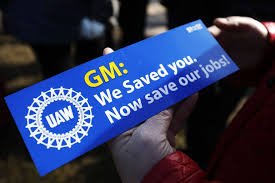
INDIANA – An auto strike will likely occur on Friday, as contract talks between the nation’s “Big Three” automakers and the United Auto Workers union appear to be stalled.
General Motors’ first wage-and-benefit offer to the United Auto Workers on Thursday fell far short of the union’s initial demands – workers called the offer “insulting.”
GM said in a letter to workers that it’s offering a 10% wage increase during a new four-year contract, plus two more 3% one-time payments. It’s also offering a $6,000 inflation payment, $5,000 more in lump sums to protect against inflation during the contract, and a $5,000 contract ratification bonus. The company wouldn’t say when the pay raises or most of the lump sums would be effective. The union also said GM rejected its demand to increase retiree pension payments and kept lower tiers of pay at component plants and parts warehouses.
The current contracts between the union and the three automakers — General Motors, Ford, and Stellantis — all expire at 11:59 p.m. on Thursday, September 14, raising the possibility of one or more strikes on September 15.
There are 550 union members of the Bedford GM Powertrain plant and approximately 703 employees in total. The Bedford plant is served by two unions the United Auto Workers which represent the production workers and the International Brother Electrical Workers which represent the skill trades.

Derek Cronin is president of the UAW Local 440, which represents workers at a GM aluminum casting plant in Bedford. Like the leaders of Local 2209 representing GM workers in Fort Wayne, Cronin said he doesn’t expect the company will meet UAW demands by the deadline and employees are prepared to strike.
“We don’t want to strike. It’s one of those things that disrupts lives for the folks out on the floor. We hope and pray that there’s an amicable agreement that meets the needs of both the company and the members,” Cronin added. “But the general sense on the floor is, there’s no getting around it … the strike is going to happen.”
GM employs about 6,000 people in its Indiana manufacturing facilities. The majority work in the Fort Wayne vehicle assembly plant, technically just outside of the city of Roanoke, Indiana. That facility produces “over 1,300” Chevrolet Silverado 1500 and GMC Sierra 1500 trucks each day, according to GM.
The company also has three other non-assembly facilities in Indiana: an aluminum diecasting plant in Bedford, a sheet metal stamping plant in Marion, and an electronic components plant in Kokomo. All of those plants are also part of these national negotiations.
GM is also part of a “joint venture” with Samsung SDI that will open an Indiana plant by 2026 just west of South Bend, in New Carlisle, to build electric vehicle batteries.
Stellantis employs “more than 7,000” people in Indiana. Those workers operate four transmission plants and a casting plant. Three are located in Kokomo and one is in nearby Tipton.
Like GM, Stellantis has its own “joint venture” with Samsung SDI which plans to have a battery plant running in Kokomo by 2025. Stellantis has also signaled resistance to making that plant part of the UAW’s national master contract.
Ford hasn’t owned any plants in Indiana since the company closed its Indianapolis steering systems plant in 2008.
There are 145,000 UAW members spread across General Motors, Ford, and Stellantis, the company that makes vehicles for the US market under the Jeep, Ram, Dodge, and Chrysler names.
The union overwhelmingly approved strikes starting September 15 against any of the companies that didn’t have a tentative labor deal in place by then.
The union has made an audacious set of demands including:
- At least 40% pay raises over four years
- A 32-hour workweek with 40 hours of pay and overtime for anything more
- The restoration of traditional pensions
- Limits on part-time workers and forced overtime
The companies, which are all expected to bring in billions in profit this year, have said that the union’s demands would undermine their ability to compete against Tesla and foreign competitors at a time when they’re investing in a massive shift toward electric vehicles and claim those demands would bankrupt GM and other Big Three companies.

“The proposal doesn’t come close to an equitable agreement. Our intent has always been not to strike,” said UAW President Shawn Fain. “That’s been our intent from day one. But as we get down to the wire here, there are three companies to bargain with and there are only a few days left to do it. So I know what it looks like to me.”



